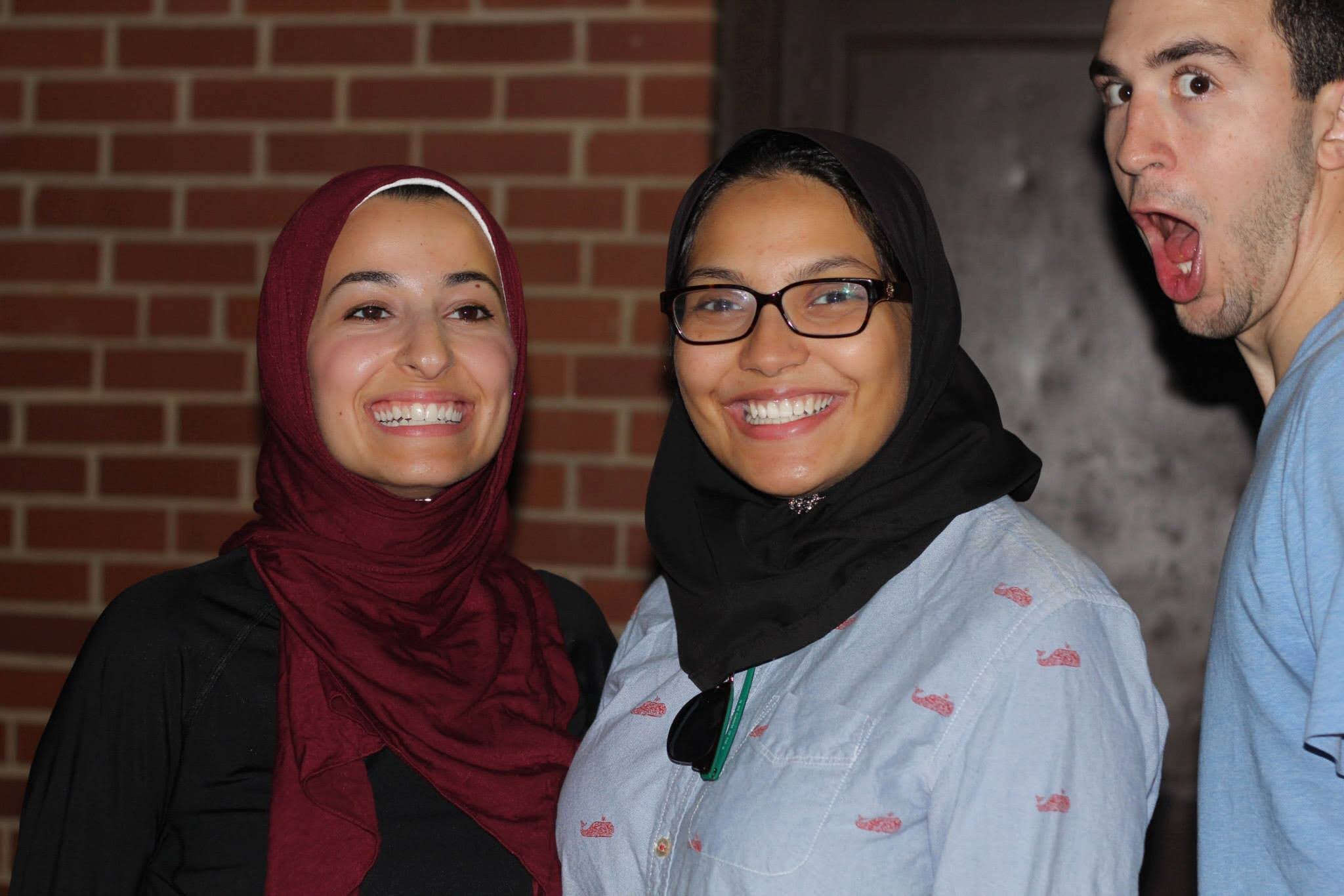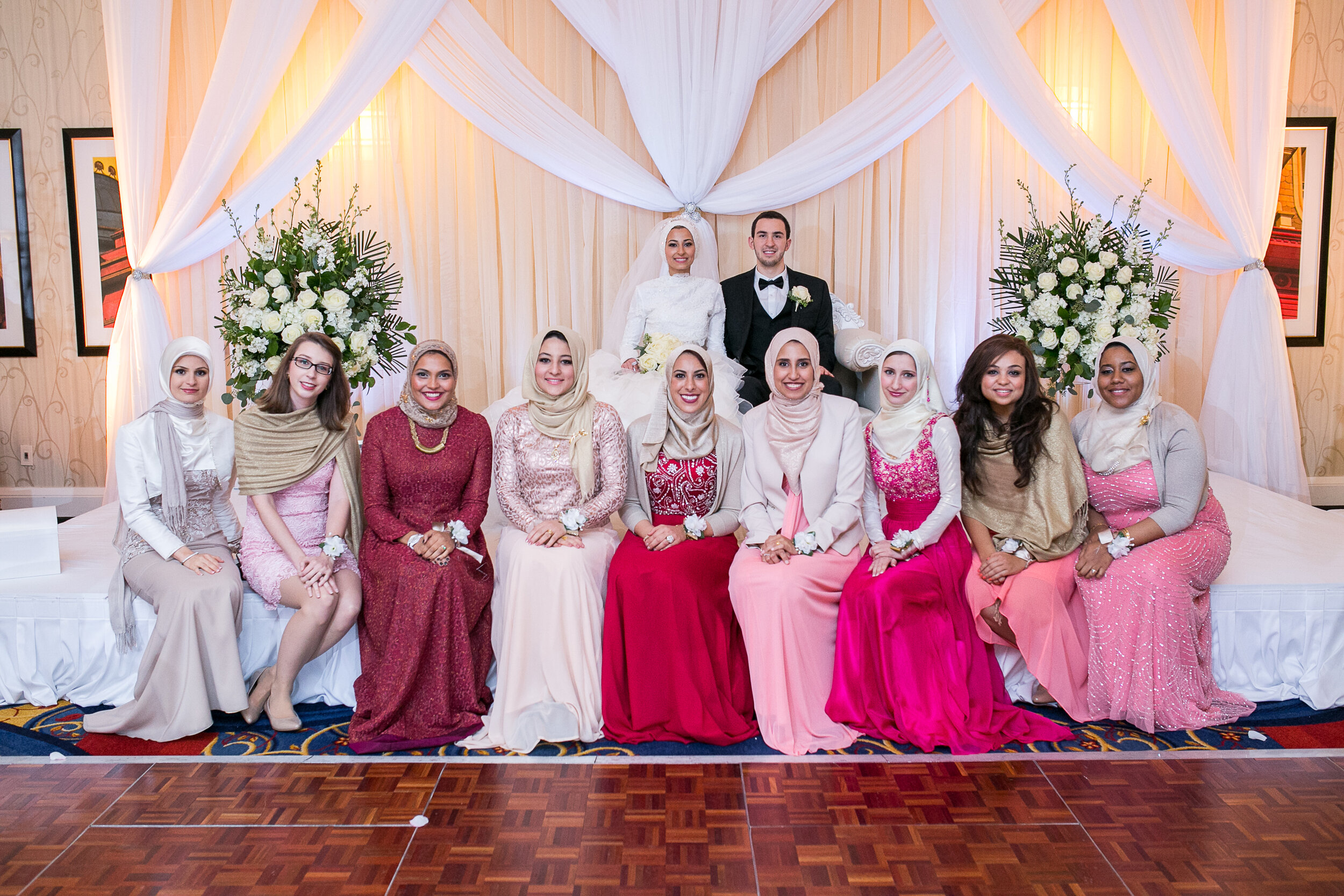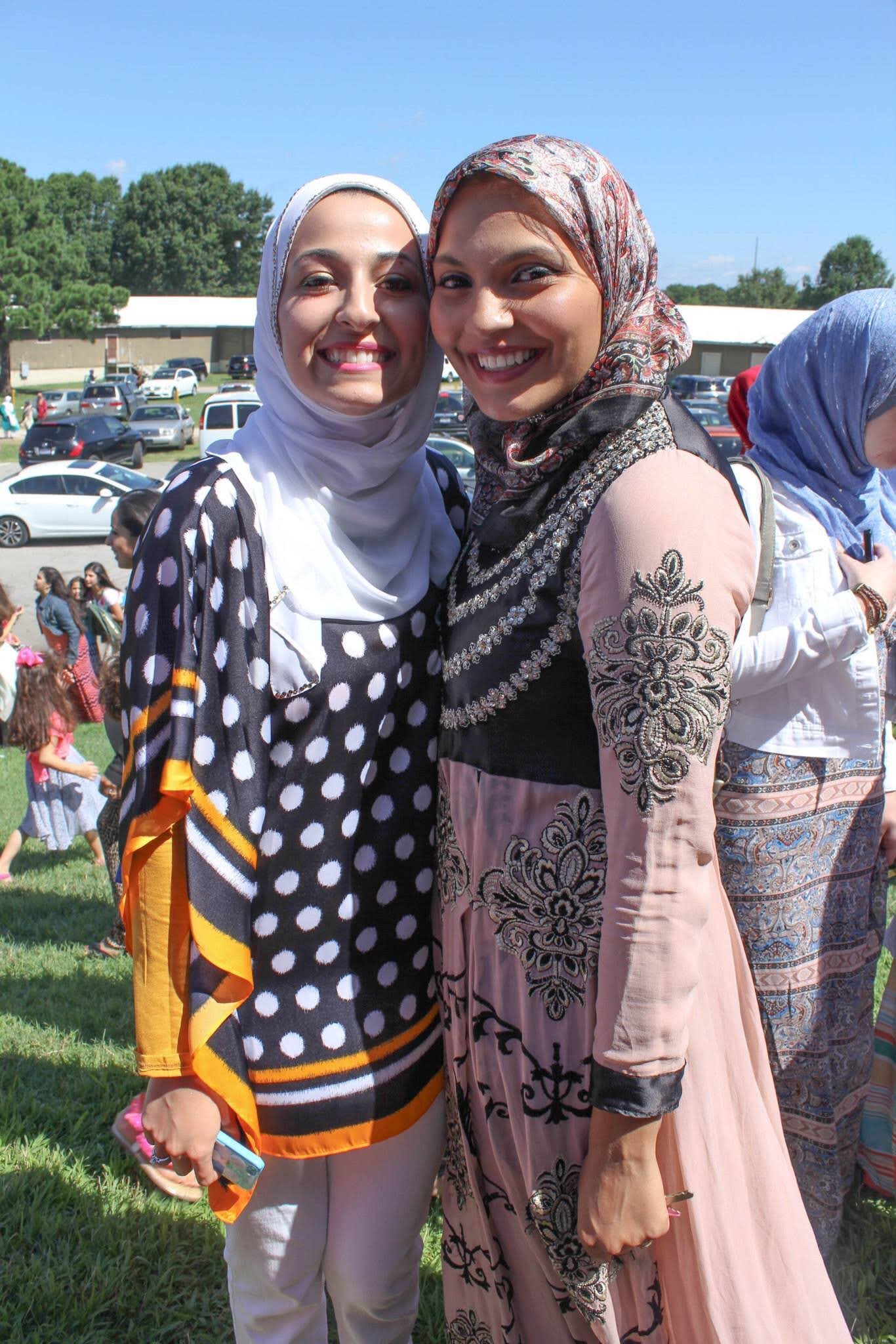After three of her dear friends were murdered in 2015 — a case that drew national attention and triggered calls for stronger hate crime legislation — Nida Allam took to politics. As a newly elected Durham County commissioner, she is the first Muslim woman elected to any political post in the history of North Carolina. Allam wants to inspire the next generation of leaders in the South and the world.
Story by Michael Venutolo-Mantovani | Photographs by Kennedi Carter
ll anyone had was an apartment number.
In the confusion surrounding the murder scene, it was the only bit of information that leaked to the public. Family and friends traded texts and calls all afternoon and into the evening, wondering if anyone had heard from Deah, Yusor, or Razan. No one had. Perhaps they were studying in a quiet library, unaware that their apartment complex was overrun by police trying to unravel the events of a gruesome hate crime. Maybe they didn’t yet know about the curious onlookers who gathered around their home, anxiously waiting to find out if they knew the victims of whatever happened inside the Finley Forest Condominiums.
Several dozen family and friends rushed to the apartment complex in a leafy and quiet corner of Chapel Hill on the evening of February 10, 2015, hoping the cops would release a bit of information. The police were typically tight-lipped, offering no details on what lay behind their blockade. Yet someone had overheard the apartment number where the dead lay.
It was all they needed to know.
Their loved ones, Deah Shaddy Barakat, Yusor Mohammad Abu-Salha, and Razan Mohammad Abu-Salha were murdered, killed by a white man known to threaten his Black and brown neighbors with violence, sometimes while brandishing one of his 13 guns. They were victims of what would, in the coming days, be painted inaccurately as an argument over a parking space.
Nida Allam spent the evening calling and texting her friends, hoping the shooting her boyfriend alerted her to, the one at her friends’ apartment complex, didn’t involve the couple she’d known since high school and had become ever-closer to while attending North Carolina State University in nearby Raleigh.
Deah Shaddy Barakat and Yusor Mohammad Abu-Salha, were recently married and living in Chapel Hill, where Barakat was studying dentistry at the University of North Carolina. Yusor Abu-Salha had just graduated NC State in December and was planning to start the same dental program as her husband that fall. Her sister, Razan Mohammad Abu-Salha, was in the middle of her sophomore year at NC State, studying architecture and environmental design and spent a lot of time visiting the newlyweds (so much that many reports would later list her as a resident of the apartment).
Finally, Nida Allam’s phone buzzed with a text.
There were no details. Just the apartment number.
It was all she needed to know.
Nida Allam was in her final semester at NC State, exploring work opportunities in the information technology and sustainability fields, when her friends were murdered in Chapel Hill.
“That’s when things started to shift for me,” the 26-year-old Allam says from the home she shares with her husband in Durham. She speaks in a quiet and measured tone during our phone interview, a far cry from the voice I heard when I saw Allam on stage in early March, stumping for Bernie Sanders with a speech that filled the Durham Convention Center with a palpable energy. Remembering her friends’ murder she recalls how suddenly, questions of what her life meant to the world; what value she might bring to those around her; what impact she could and would leave in her wake began to overtake the questions all college seniors have, as they wonder what they’re going to do with their lives.
She spent much of that spring considering how she might carry on the legacy Barakat and the Abu-Salha sisters left behind and how she could help prevent such a tragedy from befalling her community again.
“If this could happen to three people who were pillars of our community, who were proud Muslim Americans,” Allam wonders, “what are we doing as a community to make sure that it doesn’t happen to anyone else?”
As Allam began to examine how something like this could have happened, what kind of protections people were afforded locally and throughout the nation, and how it was possible that North Carolina still didn’t have hate crime prevention laws, she heard about the burgeoning campaign of an inspiring senator from Vermont.
“Seeing Bernie Sanders talk about Muslims really appealed to me,” Allam says. “He wasn’t speaking about us as stereotypes but rather as community members who are in the same fight for justice. He was a candidate who actually saw us for who we are.”
Allam recognized the Sanders campaign as a chance to honor the lives and memories of her slain friends and immediately got on board, organizing on campus and starting the NC State for Bernie club. She joined and soon became co-chair of the Triangle for Bernie club, hosting phone banks and campus canvassing in the area. Within two months of starting the on-campus Sanders group, Allam got a call from Chris Covert, Sanders’ South Carolina state director, asking her to join the campaign full-time upon her graduation. Even with a job offer from MetLife already in hand, Allam’s decision was easy.
“I couldn’t turn off this opportunity. I needed to go see what I could accomplish,” she says.
Nida Allam was drawn to Bernie Sanders 2016 campaign because she says, “He wasn’t speaking about us as stereotypes but rather as community members who are in the same fight for justice.” Allam spoke at the Sanders Rally at the Durham Convention Center, February 2020.
Sent to Pawleys Island, a region of coastal South Carolina that she describes as “probably not the best for a young Muslim girl in a headscarf,” Allam remembers early stages of her life in professional politics as difficult and sometimes frightening. Relying on other field organizers in the area, Allam found a support group of young, white political upstarts who canvassed alongside her in an effort to make her feel less unsafe.
One of those field organizers was a South Carolina native named Whitney Roberts. Roberts, who was 23 at the time, remembers getting a call from the South Carolina campaign office, asking if Allam might spend the night with her, as her campaign support housing wasn’t quite ready. The two immediately bonded and began taking turns canvassing each other’s turf as a duo, providing a sense of safety for one another they weren’t afforded alone. Roberts, who is white, admits that, while her fears were founded from binges of Criminal Minds, Allam faced a much more real sense of potential danger.
On their very first canvassing trip, Roberts approached an older white man who politely told her he was a proud Republican.
“Then he saw Nida behind me and freaked out,” Roberts says, remembering how the man came from his door, not quite chasing the pair but showing enough aggression to force them to rush back to their car. “He just started yelling about religion and terrorism and all this stuff, and it was scary.”
From her home in Washington, D.C., where Roberts currently works as a social media lead for the progressive grassroots outfit, Indivisible, she says, “For (Allam), it was a more realistic and dangerous thing…South Carolina is not really the most religiously diverse place.”
As 2015 wound to a close, Allam returned to North Carolina, but was soon promoted to Regional Field Director for the Sanders campaign in Queens, New York, where she worked until she was sent to New Jersey to focus on outreach and building relationships with statewide mosques and communities of color. After Sanders ended his campaign in July of 2016, Allam once again returned to North Carolina, where she was contacted by state representative Graig Meyer, encouraging her to run for the third vice chair position in the North Carolina Democratic Party.
Allam was so new to the machinations of politics she had no idea what a third vice chair’s role entailed. After researching the position, she found it a chance to earn her seat at the table, to organize more professionally, and, as always, to honor the memories and further the mission of her murdered friends. After a short campaign, Allam won the seat in January of 2017, becoming the first Muslim to ever serve on the executive council on the state Democratic party.
Nida Allam was born December 15, 1993 to an Indian father and a Pakistani mother in Ottawa, Ontario, Canada. When she was 6-years-old, Allam and her family moved to Cary, a small town at the center of North Carolina’s Research Triangle, so her father could take a job at IBM. With immigrants like Allam’s parents flocking to the area for work in the growing Triangle, Cary’s Muslim population was growing.
The youngest of three sisters, Allam was educated in public schools, attending Raleigh’s stately Needham B. Broughton High School. She became a naturalized American citizen when she was a teenager.
On the lacrosse field at Broughton, Allam met a Syrian-American classmate named Deah Shaddy Barakat. As Barakat played on the boys’ team and Allam on the girls’, they bonded over their sport, becoming fast friends throughout high school. Allam remembers how Barakat playfully called her ‘lax bro.’
Through the area’s tight-knit and robust Muslim community, the two came to know Yusor Mohammad Abu-Salha, a Jordan-born Palestinian student at Raleigh’s nearby Athens Drive High School.
The three developed a kinship at North Carolina State University, with Allam and Yusor Abu-Salha becoming especially close friends after their sophomore year. The two often studied together and soon became leaders of the campus’s Muslim community. As a senior, Allam chaired the Triangle Health Fair, a Muslim student-led campaign to partner with area doctors, dentists and chiropractors to provide free health care to local low-income community members. Barakat and Yusor Abu-Salha volunteered to help with advertising. Likewise, in his spare time, Barakat, by then a dental student at the University of North Carolina, worked to provide free dental supplies to the homeless in Durham, Raleigh, and Chapel Hill. Barakat and Yusor Abu-Salha began dating, and it wasn’t long before the two were married in December of 2014. Nida Allam served as a bridesmaid.
Six weeks later, on the evening of February 10, 2015, Razan Abu-Salha was visiting her sister and brother-in-law for dinner. As the trio sat down to eat, shortly after 5 p.m., they heard their neighbor pounding on the door. Barakat, with the intent to use the footage to file a restraining order, began recording video on his cell phone. He opened the door and was met with a fatal gunshot. The neighbor entered the home and murdered the two sisters as well.
Barakat was 23, Yusor Abu-Salha 21, Razan Abu-Salha just 19.
Nida Allam hopes to keep alive the legacies of her friends Deah Shaddy Barakat, Yusor Mohammad Abu-Salha, and Razan Mohammad Abu-Salha, who spent much of their too-short lives putting community above most other concerns. Deah Shaddy Barakat and Yusor Mohammad Abu-Salha were married just six weeks before their murder.
Later that evening, Craig Stephen Hicks, a 46-year-old former car parts salesman who had been known to intimidate his neighbors with threats of violence, turned himself in to authorities in the nearby town of Pittsboro.
On June 12, 2019, Hicks pleaded guilty to three charges of first-degree murder and was sentenced to three consecutive life terms in prison.
“What I wish we had said four years ago is that the murders of Deah, Yusor, and Razan were about more than simply a parking dispute,” Chapel Hill Police Chief Chris Blue said in a statement after Hicks’ plea.
“Deah, Yusor and Razan were murdered in an Islamophobic hate crime,” Barakat’s sister, Dr. Suzanne Barakat, added. “Let’s call this what it was: a terrorist attack.”
A few months prior, in March of 2019, North Carolina State Representative Nasif Majeed introduced House Bill 312, the Hate Crimes Prevention Act, which aimed to expand the scope of and protections against hate crimes around the state.
While there were many factors behind the introduction of the bill, Majeed recognizes the 2015 murders in Chapel Hill as being “a part of the fabric” of the bill, which is currently stuck in political limbo.
“Republicans have it in committee,” he says. “But come November, we’re gonna take the House back and get it onto the floor for a vote.”
Durham, North Carolina, is a progressive city in a progressive county. With arms open to tech entrepreneurs, a booming and rapidly expanding and gentrifying downtown area, and as home to the ultra-prestigious Duke University, along with its attendant research hospital system, Durham is touted as something of a Silicon Valley of the South.
In the 2016 general election, nearly 78 percent of the votes in Durham County were cast for Hillary Clinton. Democrats also won the county’s races for senate and representative seats, and the governorship, all by earning at least 75 percent of the votes cast. But Allam still saw the side of the South that made her afraid to campaign alone in Pawleys Island.
“It was hard,” she says, recalling instances of hate mail that flooded her Facebook messages. They were full of Islamophobic sentiment and questions regarding her citizenship status as she announced and campaigned for a seat as a Durham County commissioner in October 2019. So frightening were some of the messages, Allam insisted her family members change their names on social media.
“They were messaging my parents,” Allam says, noting a growing concern for her safety and that of her loved ones. She wondered if someone might try something crazy on the campaign trail.
Considering the horrible fate that had befallen her friends in 2015, she had every right to be concerned. But it wasn’t only threats with which Allam had to contend.
“I’m always open to criticism of my policy and my platform,” Allam says. “But someone at the poll told one of my friends that I wasn’t going to win because of ‘that thing around her head,’” positing that Allam’s hijab would frighten much of the Durham County electorate.
What shocked Allam was that the comment came not from an old-school rural Southerner, one who may never have seen a woman in a headscarf in person. Rather, it was from a staffer of one of Allam’s opponents and a person Allam considered a friend. Allam did her best to stay above the fray.
“But that doesn’t mean it wasn’t still hurtful,” she says.
“I’m always open to criticism of my policy and my platform,” Allam says. “But someone at the poll told one of my friends that I wasn’t going to win because of ‘that thing around her head,’” positing that Allam’s hijab would frighten much of the Durham County electorate. On March 3, 2020, Nida Allam received 39,977 votes, good enough to finish fourth and win a seat as a Durham County commissioner, where she will be sworn in this December. She was the first Muslim woman elected to any political post in the history of North Carolina.
In Brett Stargell, Nida Allam found a campaign manager who helped her maintain a healthy mental and emotional stability throughout the campaign. Originally from southern New Jersey, Stargell, a 32 year-old political consultant, moved to the Triangle in 2009 to attend Durham’s historically Black North Carolina Central University. He’s been involved in politics since interning with Barack Obama’s campaign in 2008, having since worked with mayoral candidates and statewide political movements such as Democracy North Carolina. In Allam, he saw a rising star.
“Before I got to know her on a personal level, the thing I noticed was how quickly she was able to ascend,” Stargell says. “But then when I got the context of what her call to action was, the tragedy and the death of her friends in the Chapel Hill hate crime, that being her impetus to step into the political arena, it was something that I wanted to be a part of, to help her achieve her goal.”
Stargell joined Allam’s campaign in December of 2019. As the primary election was just a few months away in March, the team got to work leveraging the relationships Allam had already developed in Durham and across North Carolina. From there, it became a game of communicating Allam’s message at scale, to speak to the electorate at large, with a focus on digital impressions, a mailbox campaign and an attempt to be present at as many town halls and political gatherings as she could between December and March.
“I didn’t feel comfortable sending my friends and volunteers out in the middle of winter to knock on doors,” Allam says. “So, mail was huge for us — as was being present at as many political forums as possible.”
With a pool of 15 Democratic candidates and zero Republicans, the race for Durham County’s five commission seats would be decided in March’s primary election.
On March 3, 2020, Nida Allam received 39,977 votes, good enough to finish fourth and win a seat as a Durham County commissioner, where she will be sworn in this December.
Allam is the first Muslim woman elected to any political post in the history of North Carolina.
Nida Allam always tries to remember that the core of her mission is to carry on the legacy of Deah Shaddy Barakat, Yusor Mohammad Abu-Salha and Razan Mohammad Abu-Salha. Her friends spent much of their too-short lives putting community above most other concerns. They strived to connect with not only their Muslim community, but with people from all backgrounds who’ve chosen to call Durham and the Reasearch Triangle their home.
As a county commissioner, Allam will be tasked with managing the county-wide budget, with a focus on how property taxes are allocated for school funding, public safety, and emergency services concerns.
One of her aims in her new role will be to increase the county’s tax base via the new businesses that are flocking to Durham, thus lessening the tax burden on its residents.
Allam will also focus how to implement and improve police community relations in Durham in response to the city’s Black Lives Matter movement.
“We’ve seen a lot of conversations about how we’re making sure that public safety includes community organization and all the on-the-ground work to make sure we’re continuing to improve the systems that we use,” Allam says.
As a new Durham County commissioner, Allam hopes to not only raise her profile as a Muslim American serving her Southern community, but also as a woman in politics.
“To build a platform where young girls can see themselves running for office is a huge passion for me,” she says. “And making sure I’m a good representative of the different demographics I embody. Being Muslim, being young, wearing a headscarf, being a woman; making sure that I’m representing all of those properly.
“I want us to reach a point where [being an elected Muslim woman] is not a matter of making history anymore,” she says.
“It’s that we can just speak about a really strong and powerful elected official who happens to be a Muslim woman.”
Michael Venutolo-Mantovani is a writer and musician living in Chapel Hill, North Carolina. Born and raised on the Jersey Shore and having spent many years living in Brooklyn and Lower Manhattan, he's happy to now call the South home. Find him on Twitter and Instagram @christglider and online at therealmichaelvm.com
A Durham, North Carolina, native by way of Dallas ,Texas, Kennedi Carter is a fine art photographer and creative director with a primary focus on Black subjects. Her work highlights the aesthetics & sociopolitical aspects of Blackness as well as the overlooked beauties of the Black experience: skin, texture, trauma, peace, love and community. Her work aims to reinvent notions of creativity and confidence in the realm of Blackness.


















